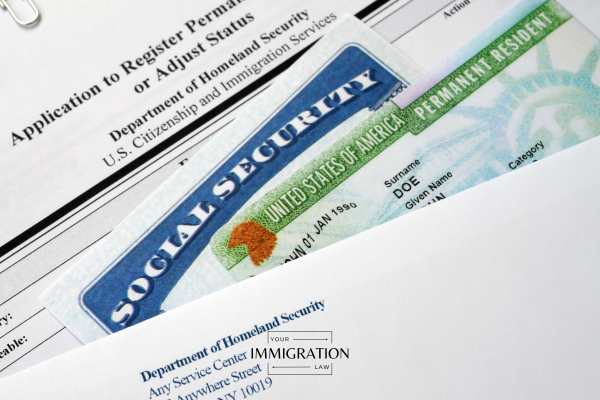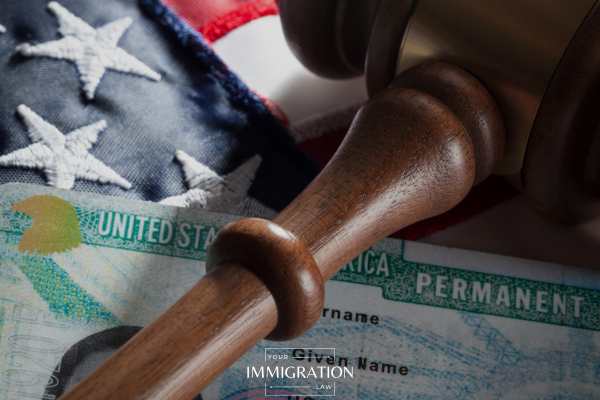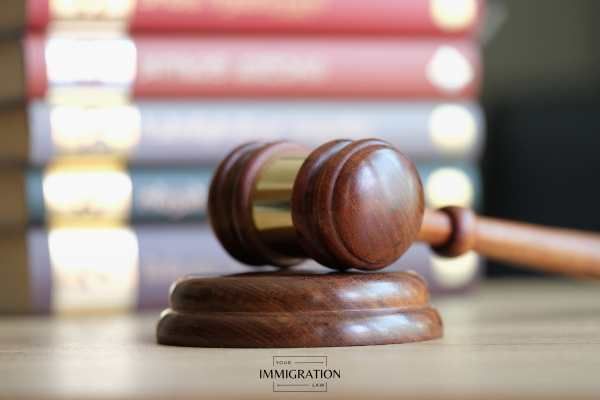Renewing a green card is an essential step for lawful permanent residents to maintain their status in the United States. As a green card holder, your residency allows you to live and work in the U.S., but it’s crucial to ensure your card remains valid. The renewal process involves specific forms, documentation, and deadlines, which can be overwhelming without proper guidance. Understanding the steps involved will help you avoid potential delays and complications.
If you’re ready to renew your green card, don’t hesitate to speak to an attorney for assistance assistance. Our team is here to provide the guidance you need throughout the renewal process. Contact our green card renewal lawyers today at (313) 631-8080 to learn more about how we can help you successfully maintain your status and secure your residency in the U.S.
What Happens If Your Green Card Expires?
When a green card expires, it can lead to several complications regarding your immigration status and rights in the United States. Here’s what you need to know:
- Loss of Proof of Permanent Residency: An expired green card means you no longer have valid proof of your status as a lawful permanent resident. This can create challenges when you need to prove your residency for employment, travel, or accessing government services.
- Inability to Travel: Traveling outside the U.S. with an expired green card can be risky. Airlines may refuse to allow you to board, and upon reentry, you may face difficulties with customs and border protection. It’s crucial to ensure your green card is valid before planning any international travel.
- Employment Challenges: Many employers require valid proof of residency to confirm your eligibility to work. An expired green card may lead to issues when seeking employment or maintaining a current job, as employers could question your legal status.
- Renewal Process: If your green card has expired, you should apply for renewal as soon as possible. The process involves submitting Form I-90, Application to Replace Permanent Resident Card. Although you can remain a permanent resident while your application is pending, it’s advisable to avoid long delays in renewal.
- Potential Loss of Permanent Resident Status: In some cases, if you do not renew your green card or remain outside the U.S. for extended periods, you may risk losing your permanent resident status altogether. It's essential to be proactive about maintaining your residency.

Consulting with an experienced immigration attorney can provide valuable guidance. They can help you navigate the renewal process and address any concerns about your residency status, especially if you have been outside the U.S. for an extended time. While an expired green card presents challenges, it’s essential to take immediate steps for renewal. Being proactive can help you maintain your permanent resident status and avoid potential complications.
How to Renew Your Green Card: Step-by-Step Guide
Renewing your green card is a crucial step in maintaining your status as a lawful permanent resident in the United States. Here’s a detailed guide to the renewal process.
Step 1: Complete Form I-90
The first step in renewing your green card is to complete Form I-90, Application to Replace Permanent Resident Card. This form is available on the U.S. Citizenship and Immigration Services (USCIS) website. When filling out the form, you’ll need important information, such as your Alien Registration Number (A-number) and your current address. Make sure to provide accurate and up-to-date information to avoid any issues later in the process.
Step 2: Submit Required Documents
Along with your Form I-90, you’ll need to submit certain documents. Typically, this includes a copy of your current green card, but if your name has changed since you received it, you may need to provide evidence of the name change, such as a marriage certificate or court order. Gathering these documents beforehand can streamline your application process.
Step 3: Pay the Filing Fee
When you submit your renewal application, you must pay the filing fee, which includes both the application fee and a biometric services fee. As of now, the total cost for renewing your green card is $540. If you cannot afford this fee, you may be eligible for a fee waiver. To apply for a fee waiver, you’ll need to complete Form I-912, which demonstrates your financial need.
Step 4: Biometrics Appointment
After your application is submitted, you will receive a notice for your biometrics appointment. During this appointment, USCIS will collect your fingerprints, photograph, and signature. This process is essential for verifying your identity and conducting background checks. It’s important to attend this appointment, as failure to do so can delay your renewal.
Step 5: Receive Your New Green Card
Once your application is processed, you will receive your new green card in the mail. The processing time can vary but generally takes several months. If you need proof of your permanent residency while waiting for your new card, you can request a stamp in your passport from a USCIS office, which serves as temporary proof of your status.
Renewing your green card may seem daunting, but by following these steps and staying organized, you can ensure a smooth renewal process. If you encounter any challenges or have questions, consider seeking legal advice to help guide you through the process.
How Long Does It Take to Renew a Green Card?
The time it takes to renew a green card can vary, but the process generally takes several months. After you submit Form I-90, the U.S. Citizenship and Immigration Services (USCIS) typically processes applications within six to twelve months. However, processing times can be affected by factors such as:
- USCIS Workload: The volume of applications being processed by USCIS at any given time can impact processing times. High application periods may lead to delays.
- Application Completeness: If your Form I-90 is incomplete or contains errors, it may lead to requests for additional information or clarifications, prolonging the process.
- Biometrics Appointment: The scheduling and completion of your biometrics appointment can affect the timeline. Delays in scheduling can lead to longer wait times.
- Background Checks: The time required for background checks and security clearances can vary based on individual circumstances.
- Local Office Variability: Processing times can differ based on the USCIS field office handling your application, as some offices may have longer backlogs than others.
- Current Policies: Changes in immigration policies or processing procedures can also impact timelines.

It’s advisable to check the USCIS website for the most current processing times for green card renewals. If you need temporary proof of residency during the wait, you can request a stamp in your passport from a USCIS office.
How Much Does it Cost to Renew a Green Card?
To renew a green card, the primary cost is the filing fee for Form I-90, which is currently $455. In addition to this, there is a biometric services fee of $85, bringing the total to $540. However, some applicants may qualify for a fee waiver based on their financial situation. It's important to check the USCIS website for the most up-to-date fees and any potential changes.
Common Errors in the Green Card Renewal Process
When renewing a green card, applicants can make errors that lead to delays or denials. Understanding these pitfalls is crucial for a smooth renewal process:
- Incomplete or Incorrect Forms: One of the most frequent mistakes is submitting Form I-90 with incomplete or inaccurate information. Omitting essential details, such as your Alien Registration Number (A-number) or current address, can lead to delays or denial.
- Failing to Submit Required Documents: Applicants often overlook necessary documents that must accompany the renewal application. This could include a copy of the current green card, evidence of name changes, or other supporting materials that demonstrate eligibility.
- Incorrect Filing Fee: Submitting the wrong fee is another common error. Ensure that you verify the current filing fee for Form I-90 and include payment in the correct format. Failing to include the fee or using an outdated amount can result in rejection of your application.
- Not Following Biometric Appointment Instructions: Some applicants fail to attend their biometrics appointment or do not bring the required identification. This can significantly delay the renewal process, as USCIS cannot proceed without your biometrics.
- Ignoring the Deadline: Applicants may forget to file for renewal before their green card expires. It's essential to submit your application at least six months before the expiration date to avoid complications.
- Misunderstanding Residency Requirements: Some individuals incorrectly assume that they can maintain their green card status despite prolonged absences from the U.S. Understanding the residency requirements and how extended travel may affect your status is crucial.
- Lack of Attention to Updates: Failing to check for updates on your application status through the USCIS website can lead to missed notices or requests for additional information. Staying informed throughout the process is important.
- Not Seeking Professional Help: Finally, many applicants do not seek assistance from an immigration attorney, which can be a mistake. An attorney can provide valuable guidance to navigate the complexities of the renewal process and help avoid common pitfalls.
Being aware of these common errors can help streamline the green card renewal process and increase the chances of a successful application.
Your Options if a Green Card Renewal Is Denied
If your green card renewal is denied, you may have several options to consider. First, you should receive a notice from USCIS explaining the reasons for the denial. Carefully reviewing this notice is crucial, as it will guide your next steps.
- Understand the Denial Reasons: The denial could stem from issues like incomplete applications, failure to provide required documentation, or criminal activity. Addressing these issues is key.
- File an Appeal: If you believe the denial was unjust, you can file an appeal with the Administrative Appeals Office (AAO) or a motion to reopen or reconsider the case. Ensure you adhere to the specified timelines for filing.
- Reapply: If an appeal is not suitable or you prefer a different approach, you may choose to reapply for your green card. This involves submitting a new Form I-90 and addressing any previous concerns highlighted in the denial.
- Consult an Immigration Lawyer: It’s advisable to seek legal assistance. An experienced immigration lawyer can provide guidance specific to your situation, helping you understand your options and prepare for any necessary actions.
- Explore Alternative Options: Depending on your circumstances, you might consider other immigration paths, such as applying for a different visa or status.
It's essential to act promptly and remain aware of your rights and responsibilities throughout this process.
How to Appeal a Denied Green Card Renewal
Appealing a denied green card renewal involves several steps:
Review the Denial Notice
Start by thoroughly examining the denial notice you received from USCIS. This document will outline the specific reasons for the denial, which could range from missing documents to issues with your eligibility. Understanding these reasons is crucial for addressing them effectively in your appeal.
Prepare Your Appeal
To initiate the appeal process, you need to complete Form I-290B, Notice of Appeal or Motion. This form allows you to appeal the decision made by USCIS. It’s important to fill out this form accurately, paying close attention to any required sections. Clearly state why you believe the decision should be overturned, referencing the issues mentioned in the denial notice.

Gather Supporting Documents
Collect any documents that can bolster your case. This might include new evidence that was not available at the time of your original application, corrections to previously submitted information, or additional proof of your eligibility. For example, if the denial was due to insufficient evidence of your residency, you might provide new utility bills or lease agreements.
File the Appeal
Submit your completed Form I-290B along with any supporting documents to the address specified in the denial notice. Ensure that you include the required filing fee. If you cannot afford the fee, you can request a fee waiver using Form I-912, Request for Fee Waiver, by providing a justification of your financial situation.
Wait for a Decision
Once your appeal is filed, be prepared for a waiting period. The processing time for appeals can vary significantly, often taking several months. During this time, USCIS may request additional information or documentation to clarify your case. It’s essential to respond promptly to any such requests.
Consider Further Options
If your appeal is denied, you still have options. You can request a review from the Administrative Appeals Office (AAO) or consider filing a motion to reopen or reconsider the case. These steps may involve more paperwork and fees, so it's advisable to consult with an immigration attorney who can guide you through the next steps.
Seek Legal Assistance
Throughout this process, consider consulting with an immigration attorney. They can help ensure that your appeal is well-prepared and that you understand all your options, increasing your chances of a successful outcome.
Appealing a denied green card renewal can be complex, but with careful preparation and attention to detail, you can navigate the process effectively.
Get Assistance Renewing Your Green Card
Renewing your green card is a vital process to maintain your lawful permanent residency in the United States. Ensuring that your application is completed correctly and submitted on time can prevent potential issues with your status. With the right support, you can navigate this process smoothly and with confidence.
If you're ready to start your green card renewal, don’t wait. Contact us today for experienced legal guidance and assistance to ensure your renewal is handled efficiently. Let us help you secure your residency status without any unnecessary delays.